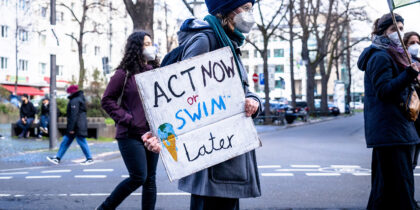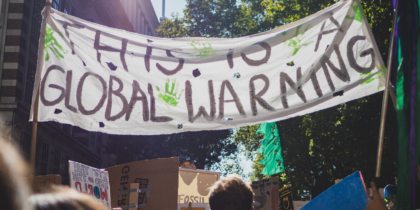By Alex Bond
Climate change is not a new discovery. For 30 years we have known about the impacts of burning fossil fuels, of deforestation and of polluting our environment. The pursuit of short-term profit at the expense of long-term human and environmental wellbeing has been embedded into the very foundation of our society, and now young people are faced with alarming statistics and warnings from scientists.
Governments’ track-record of failing to act on climate change makes it difficult to have faith in hastily made pledges from our leaders. Already, it’s too little too late. Abstract promises to cut emissions, alongside the constant setting of new, increasingly unlikely-sounding targets, has led to widespread disillusionment among many young people. Greta Thunberg laid it out plainly in a recent speech at the Youth4Climate summit in Milan: “they clearly don’t listen to us. Our emissions are still rising. The science doesn’t lie.”
Abstract promises to cut emissions, alongside the constant setting of new, increasingly unlikely-sounding targets, has led to widespread disillusionment among many young people
Indeed, the science tells us that global emissions are set to increase 16% by 2030. To put that into perspective, emissions would need to decrease by around 50% in order to keep global temperatures from rising above 1.5C. The consequences of such a trajectory are stark. Above 1.5C habitats will be decimated and ecosystems will die off. Extreme weather events, leading to flooding, will increase, along with instances of wildfires. More and more people will struggle to access food and water.
It should come as no surprise, therefore, that eco-anxiety, and even feelings of hopelessness about the future, are affecting young people all over the planet.
How does eco-anxiety impact young people?
Nothing highlights generational divide quite like the topic of climate change, with young people reporting significantly higher levels of concern than their parents and grandparents. After all, it is this upcoming generation who will deal with the consequences of the climate crisis, or who will have to make the greatest sacrifices in order to mitigate it. If we are to limit global temperature rise to 1.5-2C above pre-industrial levels, then people born after 1997 will need to keep within a lifetime carbon budget six times smaller than that of their grandparents.
A global study on young people and eco-anxiety found that 4 in 10 young people are planning not to have children due to their fears about the climate change, and a shocking 56% of young people surveyed felt that humanity was doomed. 45% of the 10,000 young people surveyed across 10 countries said that eco-anxiety was affecting their daily lives and ability to function.
45% of the 10,000 young people surveyed across 10 countries said that eco-anxiety was affecting their daily lives
The importance of addressing young people’s mental health needs cannot be understated, particularly within the context of a decade’s worth of austerity cuts, including in mental health services, and the ongoing mental health impacts of COVID-19. When eco-anxiety is thrown into the mix, it paints a very worrying picture.
The question of combatting eco-anxiety is complex. On the one hand, reducing the anxiety, hopelessness and emotional distress that many young people feel regarding climate change is vital. Being overwhelmed by anxiety of any kind has a knock-on impact on a young person’s experience of education, their relationships with friends and family, and their physical health. We are also right to be concerned that eco-anxiety is potentially exacerbating pre-existing mental health difficulties, or making it more difficult for young people to handle other challenges in their lives.
there is also something insidious about seeking to treat eco-anxiety solely as a mental health symptom
However, there is also something insidious about seeking to treat eco-anxiety solely as a mental health symptom, as opposed to taking the cause of the anxiety seriously. Young people are not worried for no reason, and this kind of emotional response is often entirely proportional to the scale of the threat that climate change poses. Teaching people ways to cope with mental distress about climate change is necessary and important, but it is not a solution to the core problem. There is a delicate balance to be found between supporting young people to be mentally well, while also validating their very real concerns.
Action as a solution
Anxiety can often be paralysing, particularly when people feel powerless. Without a clear outlet or direction, a strong sense of urgency and a need for action can, paradoxically, cause people to tune out completely. Indeed, the more serious and insurmountable climate change begins to feel, the less inclined some young people are to act.
Making the drastic changes necessary to avert climate catastrophe feels extreme, frightening and almost unimaginable for many of us. What else can we do, with no clear path before us, other than put climate change out of our minds on a day-to-day basis? Especially when we have other, more immediate concerns.
I believe that the conversation around climate anxiety should focus on constructive solutions. How can these emotions be harnessed in a way that helps to alleviate feelings of helplessness, and instead empowers young people to take positive, meaningful action?
Young people do not need to be told about the scale of the problem. They already know it, and feel it. What we need is the opportunity to do something about it.
Next steps
Involvement in local environmental activism can help young people who struggle with eco-anxiety, particularly as changes on a local scale tend to be more tangible and encouraging compared to larger-scale activism. Transforming a local green space, educating your friends, family and neighbours on greener transport options, or campaigning for change on a specific environmental issue close to home are all great ways to get started and to push against the feeling of powerlessness. It is important to break down the binary between ‘climate activists’ and ‘people who do nothing’, particularly given that people from ethnic minority backgrounds are under-represented in the environmental movement. Everyone has something to contribute to combatting climate change, on both a small and large scale.
everyone has something to contribute to combatting climate change, on both a small and large scale
Young climate activists are dedicated, innovative and rightly angry. Their work, and the movements they have created, are the greatest source of hope for other young people who have been wrestling with the same concerns. The Fridays for Future school strikes, first started by Greta Thunberg, gained global traction and media attention, but this is only one example of the widespread action being undertaken by young people across the globe. From Anjali Sharma, who took on the Australian government in order to prevent the building of a new coal mine, to the founders of Zero Hour in the United States, young people are well organised and demanding change.
Eco-anxiety is based on real fears of real threats that young people face. It needs to be taken seriously and it requires concerted action to address both the causes of the climate emergency and the feelings of hopelessness and powerlessness too many young people face today.
Alex Bond is a Communications Trainee at Groundwork UK.
Groundwork’s Youth in a Changing Climate report explores the way that young people in the UK feel about climate change, how it impacts their lives and what action needs to be taken.







